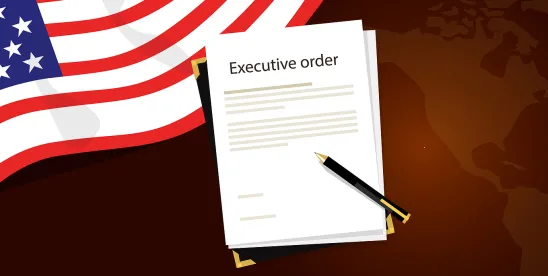On January 21, 2025, President Trump signed two Executive Orders (“EOs”) taking aim at diversity, equity, and inclusion (“DEI”) within federal agencies and the federal contractor workforce: Ending Illegal Discrimination And Restoring Merit-Based Opportunity and Ending Radical and Wasteful Government DEI Programs and Preferencing. Accordingly, federal contractors must now re-familiarize themselves with the Trump administration’s view on workplace DEI initiatives. These EOs represent a sharp contrast in the new administration’s expectations regarding workplace DEI compared to the Biden administration.
The Trump administration regards DEI initiatives as suspect based on the belief that these initiatives involve lowering applicable professional standards and discrimination against those viewed as capable of advancing based on merit. As the President articulated in the EO titled “Ending Illegal Discrimination and Restoring Merit Based Opportunity,” DEI is “a pernicious identity-based spoils system.” President Trump stated in his inaugural address that he intends to “forge a society that is colorblind and merit-based.” In furtherance of this objective, the President revoked EO 11246, which for more than six decades has prohibited federal contractors from making employment decisions on the basis of race, color, religion, sex, or national origin. While racial discrimination in hiring remains illegal under the Title VII of the Civil Rights Act of 1964, the Trump administration also ordered the Civil Rights Division of the Department of Justice to immediately freeze much of its activity, including not pursuing any new discrimination cases.
What Do Contractors Need to Know About President Trump’s EO “Ending Illegal Discrimination and Restoring Merit-Based Opportunity”?
In this second presidential term, the Trump administration demonstrates greater awareness and sophistication in leveraging existing legal frameworks to enforce its view of DEI initiatives and principles. Accordingly, contractors should expect heightened government scrutiny and legal challenges as the Trump administration seeks to demonstrate its ability to force contractors to align with its viewpoint that explicit efforts to achieve workplace diversity constitute unacceptable racial discrimination.
- Agreement Regarding to Materiality Under the False Claims Act: One of the biggest takeaways for federal contractors is that this EO requires the head of each agency to include a contract term in which the contractor agrees that its “compliance in all respects with all applicable Federal anti-discrimination laws” is material to the government’s payment decisions for purposes of the False Claims Act (“FCA”) (section 3729(b)(4) of title 31).
- Certification: The EO also requires an award recipient to certify that it does not operate any programs “promoting DEI that violate any applicable Federal anti-discrimination laws.” This certification, if viewed as false by the Trump administration’s Justice Department, could become the basis for an allegation of an FCA violation.
- Expected Government Investigations: The EO directs the Attorney General to identify “up to nine potential civil compliance investigations of publicly traded corporations, large non-profit corporations or associations, foundations with assets of 500 million dollars or more, state and local bar and medical associations, and institutions of higher education with endowments over one billion dollars.” This demonstrates the Trump administration’s willingness to invest government resources into challenging the DEI programs of large organizations.
- Expected Litigation: The EO directs the Attorney General to report on ways in which the private sector can be encouraged “to end illegal DEI discrimination and preferences and comply with all federal civil-rights laws” and to identify opportunities for the Trump administration to engage in lawsuits.
What Do Contractors Need to Know About President Trump’s EO “Ending Radical and Wasteful Government DEI Programs and Preferencing”?
While this executive order is directed to federal agencies, it demonstrates the sweeping nature of the Trump administration’s efforts to eradicate DEI principles from the workplace.
- Termination of DEI Programs: The EO mandates the termination of all DEI programs within federal agencies. This includes any initiatives, training, or policies that are specifically designed to promote DEI within the federal workforce, which the EO describes as “radical and wasteful.” Relatedly, the Trump administration issued a memo directing all federal agencies to place any DEI professionals within their ranks on paid leave as of January 22, 2025. The Trump administration also provided agency heads with a directive warning of “adverse consequences” for anyone who fails to report any of their colleagues (to a specified email address created for this this purpose) who try to circumvent orders to immediately cease DEI-related activities.
- Prohibition of Preferences Based on Identity: Consistent with EO 11246 (which the President revoked), the new Trump EO explicitly prohibits federal agencies from giving preferential treatment to individuals based on race, color, religion, sex, or national origin in hiring, promotion, or any other employment decisions.
- Review and Rescission of Existing Policies: Federal agencies are required to conduct a comprehensive review of their existing policies, programs, and practices to identify any that are inconsistent with the new directive. Any policies or programs that are found to be in violation of the order must be rescinded or modified to comply with the new guidelines. This includes reviewing training materials, hiring practices, and any other initiatives that may have been implemented to promote DEI within the agency.
What Should Contractors Do to Comply with the New EOs?
- Contractors should conduct a privileged review of their existing DEI programs to identify any potentially problematic features such as race- or gender-based quotas, or to consider adding a mission statement to clarify that the contractor’s diversity efforts seek to identify and cultivate all existing talent and do not have the effect of lowering any applicable standards or commitment to excellence.
- Contractors should also consider a privileged review of their documented merit-based criteria for hiring, promotions, and other employment actions. This may involve updating job descriptions, performance evaluation processes, and training programs to focus on skills, experience, and performance.
- Contractors should consider developing consistent guidance for employees, as they may have questions about the organization’s continued commitment to diversity and inclusion, and whether such a commitment is lawful, or where to go if they have concerns.
We will continue to closely monitor the implementation of these executive orders and will report on any new developments.



 />i
/>i
